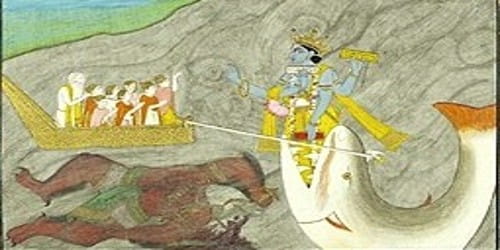Protector of the Fish (A Hindu Tale)
In India, the people say the great Ganges River flows from the toe of Vishnu, the Sun God. It is a holy river. Guarded and blessed by Ganga, goddess of rivers, the Ganges provides for the people, and whenever Ganga travels to the sea, she spreads her blessings everywhere. Rice grows thick along the riverbanks, and those who bathe in the river are washed clean, body and soul. When the ashes of the dead are spread over the river, they are cleaned of all their sins, ready to be born again, pure and good.
That is what the Hindu believes, and they also say that wherever Ganga journeys, the Makara rides upon her back, helping to spread goodness. Very few have seen the Makara, but everyone knows about him.
You would recognize the Makara if you saw him, for though he has the body and tail of a fish, his head looks like the head of a deer; his legs are as muscular and agile as an antelope’s. The Makara is a god of the sea, as good as his mistress, and the people say the Makara rewards those who are good, punishes the cruel and protects the helpless.
Those who try to harm others should watch out for the Makara. That is what the crane learned one day long ago. The Makara was traveling alone when he spied a large crane walking along the banks of the river. Now and then the crane would stop, dip his beak into the river and lift out a tiny fish. All around him, the fish gathered, leaping and swimming madly.
The Makara swam closer, watching the crane at his work, and he saw that the crane was whispering to the fish. “I’ll take you to a golden place,” he whispered, and the fish leaped out of the sea.
Again the crane would catch a fish in his beak, hurry round the bend, and return to whisper once again to the others.
After a while, the Makara swam close to shore, stopping in the shallow water just beside the crane, who whispered once again to the fish. “A golden land where all is peaceful and good,” he said, and a fish leaped into his beak.
“Good day to you, sir,” the Makara said to the crane, and the crane nodded his head. He could not speak, for he carefully held the fish in his beak.
“Excuse me,” said the Makara, “I don’t mean to intrude, but I was wondering where this golden land you speak of is. I’ve been watching you taking those fish around the bend, and I’d love to know more about the golden land of peace.”
The crane looked the Makara up and down, nodding his head this way and that, wondering whether or not to answer. At last, he dropped his fish into the river. “Sir,” said the crane, “I am, as you can see, rescuing these poor, helpless fish.”
“I see,” said the Makara, “but I’m afraid that I don’t understand. Just how are you rescuing them?”
The crane raised his head high. “Why, I’m rescuing them from fishermen, of course,” he said proudly. “Without me, these fish wouldn’t stand a chance, for surely the fishermen would capture them and eat them. I hope to save all the fish in the river. As you can see, I’ve just begun my work. The golden land isn’t far, but these poor fish cannot get there on their own.”
The Makara thought for a long while. At last, his eyes sparkled, and he moved closer still to the crane. “Good crane,” he whispered, “I wonder if you might consider rescuing me. I would love to see the golden land.”
The crane was delighted at this opportunity, for the Makara looked tastier than any fish he’d ever seen before. And so, without a moment’s hesitation, using his big, strong beak, the crane lifted the Makara and carried him around the bend.
There, beside a huge rock, the Makara saw the skeletons and bones of dozens of fish scattered in the damp sand. He quickly summoned all his strength and leaped from the crane’s beak. Turning, he slapped the crane with his mighty tail, and the crane fell helpless, bruised and terrified, upon the sand.
“You should not harm the fish,” the Makara said, “and you must not lie to others to satisfy your own desires.” With that, he swam back around the bend to tell the fish what had happened to their brothers and sisters.
“Do not listen to idle boasts and promises,” the Makara warned the fish, and from that day on, the fish were careful and cautious, darting as quickly as they could away from the hungry crane. The people then called the Makara the protector of the fish.
















